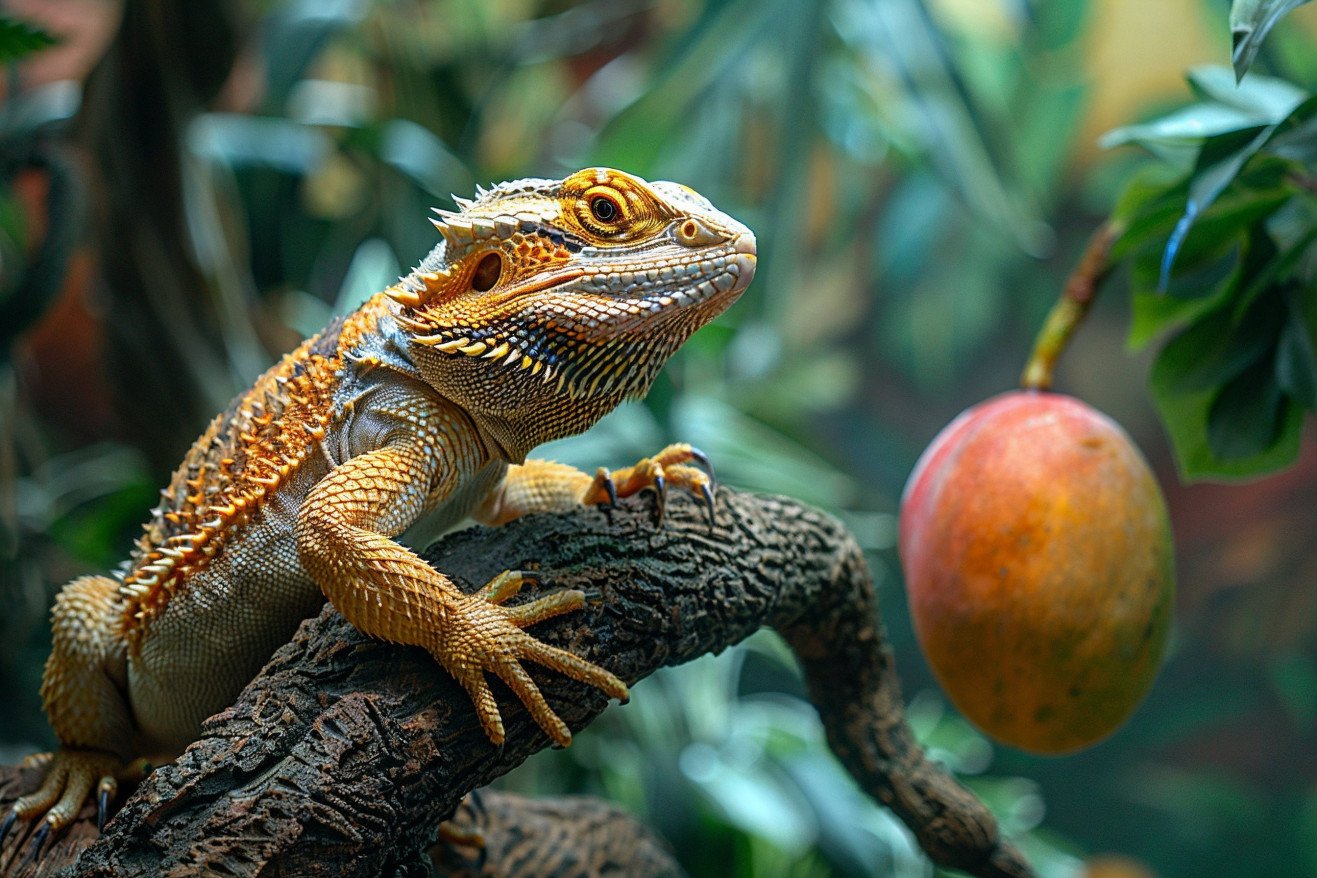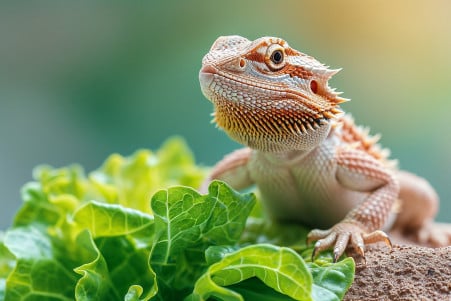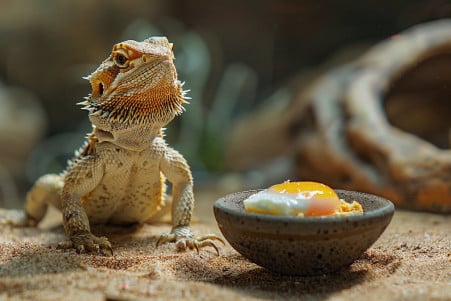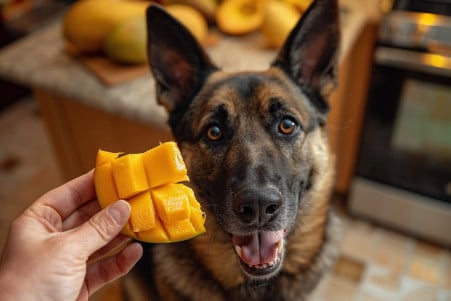Can Bearded Dragons Eat Mangos? A Look at Tropical Fruits in Their Diet
25 May 2024 • Updated 25 May 2024

Bearded dragons are popular pets with very specific dietary needs, and one of the questions many bearded dragon owners have is whether or not their pet can enjoy the sweet and tangy taste of mangos. The answer is yes, bearded dragons can eat mangos, but they should be fed to them in moderation and only as an occasional treat. Mangos are a tropical fruit that is high in vitamins A and C, which are important nutrients. However, because of their high sugar and water content, mangos should be fed to bearded dragons in small amounts, usually making up no more than 10-15% of their diet.
To provide a more in-depth exploration of this subject, we will review the research of herpetologists and exotic animal vets who have studied the complex dietary needs of bearded dragons. With their help, we will cover exactly how fruits like mangos should be included in a bearded dragon's diet to make sure it's well-rounded and healthy. This will give you the information you need to make sure your bearded dragon is getting the nutrition it needs while still getting to enjoy a sweet treat now and then.
Can bearded dragons eat mangos?
What Fruits Can Bearded Dragons Eat?
Bearded dragons are omnivorous reptiles, requiring a diverse diet of insects, vegetables, and the occasional fruit treat. As Zen Habitats notes, safe fruit options include berries, melons, mangos, and apples when fed in moderation. However, citrus fruits like oranges and lemons should be avoided due to their high acidity and oxalic acid content, which can lead to health issues according to Dragon's Diet.
While fruits provide vitamins and variety, they should only make up 10-20% of a bearded dragon's overall diet, as recommended by Reptilinks. A balanced reptile menu revolves around nutrient-dense vegetables and a protein source from insects. Variety is crucial to ensuring your beardie receives a well-rounded intake of essential vitamins, minerals, and other nutrients.
By incorporating a diverse array of safe fruits and veggies alongside insects, you can craft a complete and healthy diet for your scaly companion. With moderation and the right mix of foods, you'll be able to satisfy your bearded dragon's nutritional needs while allowing for the occasional sweet treat.
Frequency and Portion Size
According to Dragon's Diet, fruit should be given once a week, not daily. Juvenile bearded dragons need less fruit than adults because they need more protein, while adults can have a little more fruit, but it should still be limited.
Similarly, Falls Road Animal Hospital explains that adult bearded dragons don't need as much protein as babies or juveniles and should be getting most of their diet from nutrient-dense greens and vegetables. Overconsumption of fruit can lead to obesity, gastrointestinal problems, and other health issues. The right portion sizes depend on the age and size of the bearded dragon, according to Zen Habitats.
Safe Ways to Prepare and Feed Mangos
To avoid potential problems, it’s important to prepare mangos properly before feeding them to your bearded dragon. According to Pet Keen, mangos should be ripe, peeled, and cut into small pieces to prevent choking. Before feeding, make sure to remove the pit and any stringy parts of the fruit, which can lead to digestive issues.
Mangos can be fed as a standalone treat or added to a salad with other safe fruits and vegetables, as suggested by Leka on Medium. However, frozen and dried mangos should be rehydrated and fed in moderation because they have a higher sugar content.
To make sure your bearded dragon is eating properly, it’s important to watch them while they eat, according to Hepper. This way, you can make sure they aren’t showing any signs of discomfort or experiencing any digestive issues as a result of eating the mango.
If you follow these safe preparation and feeding tips, you can give your bearded dragon the occasional sweet and nutritious treat of mango without putting their health at risk.
Risks and Symptoms of Mango Overconsumption
Although mangos can be a nutritious and delicious snack for bearded dragons, overconsumption can lead to obesity, digestive problems, and other health issues. TopFlight Dubia notes that mangos are high in sugar, so they should be fed in moderation and not as a staple of the diet. Symptoms of overconsumption can include lethargy, loss of appetite, and changes in stool.
It's important to schedule regular vet visits when introducing new foods to look for any negative reactions, as mentioned by TopFlight Dubia. Additionally, respiratory infections or pneumonia can be caused by environmental issues or pathogens, according to the JustAnswer forum. If your bearded dragon is showing any symptoms of concern, it's important to get them to a vet as soon as possible.
Knowing the risks and keeping an eye on your dragon for any negative reactions will help you make sure that you're feeding them mangos and other fruits in a way that's healthy and balanced. With the right care, your reptile can enjoy a sweet snack every now and then without any negative effects.
Conclusion: Moderation and Balance in a Bearded Dragon's Diet
The Dragon's Diet offers a detailed look at what a bearded dragon should eat. Since bearded dragons are omnivores, they need a mix of insects, flowers, fruits, and vegetables in their diet. Fruit should account for 10-20% of their diet, and there are many different fruits that can be included, such as apples, bananas, berries, melons, and mangos.
According to VCA Animal Hospitals, a bearded dragon's diet should be 50% plant-based and 50% animal-based. Healthy vegetables include leafy greens, squash, and sweet potatoes, and acceptable fruits include mangos, pineapples, and melons. However, fruits are lower in minerals, so they should be fed in moderation and used as treats.
It's also important to think about the specific fruits and vegetables that are being offered. VCA Animal Hospitals warns that some greens, such as cabbage and kale, can cause thyroid issues if they are eaten in large amounts. By making sure that you're feeding your bearded dragon a diet that includes a good mix of nutrients, you can make sure that they're healthy and happy, even if they're enjoying a sweet treat every now and then.


